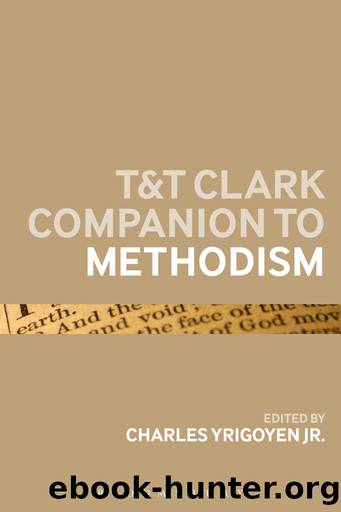T&T Clark Companion to Methodism by Charles Yrigoyen Jr;

Author:Charles Yrigoyen Jr;
Language: eng
Format: epub
ISBN: 9780567662460
Publisher: Bloomsbury UK
Published: 2014-08-15T00:00:00+00:00
18Methodismâs Polity: History and Contemporary Questions
Thomas Edward Frank
Methodism in the twenty-first century faces some of its most creative and challenging opportunities for shaping the polity for a global church. As Methodism continues its rapid expansion in sub-Saharan Africa and sustains its vitality in Europe, Eurasia, the Philippines, the Americas, and other regions, the movement must address emerging questions of the kind of global communion it will be. These questions with their catholic and ecumenical reach are inseparably related to the practices of Methodist churches in local places and social contexts. A worldwide communion of churches means little apart from the vitality of churches in particular places, and local churches cannot be vital without connection among churches across the world. The relation of global and local, particularly the common discipline that binds local, regional, and world churches in a connectional covenant, will remain the most significant point of tension and promise for the future of Methodism.
Methodism embarks on its political challenges with only a minimal foundation of established scholarship or lively intellectual debate about the distinctly Methodist heritage of polity and possible new forms of governance. The nineteenth century â the era in which independent Methodist bodies became more formally constituted and adumbrated in England and the USA and in which Methodist missions in Asia, Africa, and Latin America began to take more permanent churchly form â was marked by intense exchanges among scholars and church leaders about such polity issues as the authority and organization of conferences, the powers and duties of bishops and the grounding of their authority in apostolicity, the balance of power among clergy and laity, and the oversight and control of agencies for education, publication, mission, and other initiatives.1
Similarly, the twentieth century (through the 1960s) produced fervent and often heated debate over polity. The era was marked by political initiatives that achieved a series of organic church unions reshaping Methodism in the USA, Europe, and other regions, and produced Methodismâs union with other Protestant traditions in India, Zambia, and other nations.2 Methodism in many nations newly independent of colonialism was reorganized from the status of missions of US or European churches into autonomous churches. Methodism addressed persistent divisions of race and gender, abolishing the racially segregated Central Jurisdiction of the Methodist Church in the USA and opening the way for the election of women as conference delegates, ordained clergy, and election and consecration as bishops.3
The period since the 1960s, however, has produced a subdued silence of debate on Methodist polity. Few books or articles on polity are published. Only a handful of scholars address the subject. For a large worldwide movement now well into its third century, Methodism is notable for having no network or association of specialists in its canon or church law. By contrast, Roman Catholicism and Anglicanism support active societies of scholars and specialists with over twenty journals published in English. Methodist forms of church discipline lack foundations in political philosophy and ecclesiology that undergird the canon law of those communions. One searches
Download
This site does not store any files on its server. We only index and link to content provided by other sites. Please contact the content providers to delete copyright contents if any and email us, we'll remove relevant links or contents immediately.
| Baptist | Book of Common Prayer |
| Calvinist | Episcopalian |
| Inspirational | Lutheran |
| Methodist | Pentecostal & Charismatic |
| Presbyterian | Quaker |
| Seventh-Day Adventist | Shaker |
| Theology |
Fangirl by Rainbow Rowell(8786)
How to Bang a Billionaire by Alexis Hall(7931)
Wonder by R. J. Palacio(7742)
The Space Between by Michelle L. Teichman(6575)
The Thirst by Nesbo Jo(6437)
Assassin’s Fate by Robin Hobb(5855)
Wiseguy by Nicholas Pileggi(5316)
The Night Circus by Erin Morgenstern(5037)
The Kite Runner by Khaled Hosseini(4952)
Paper Towns by Green John(4797)
Bittersweet (True North #1) by Sarina Bowen(4715)
Gerald's Game by Stephen King(4374)
Too Much and Not the Mood by Durga Chew-Bose(4091)
Pillow Thoughts by Courtney Peppernell(4011)
Goodbye Paradise(3446)
Twelve Days of Christmas by Debbie Macomber(3412)
Good by S. Walden(3346)
The Rosie Effect by Graeme Simsion(3207)
The Cellar by Natasha Preston(3077)
